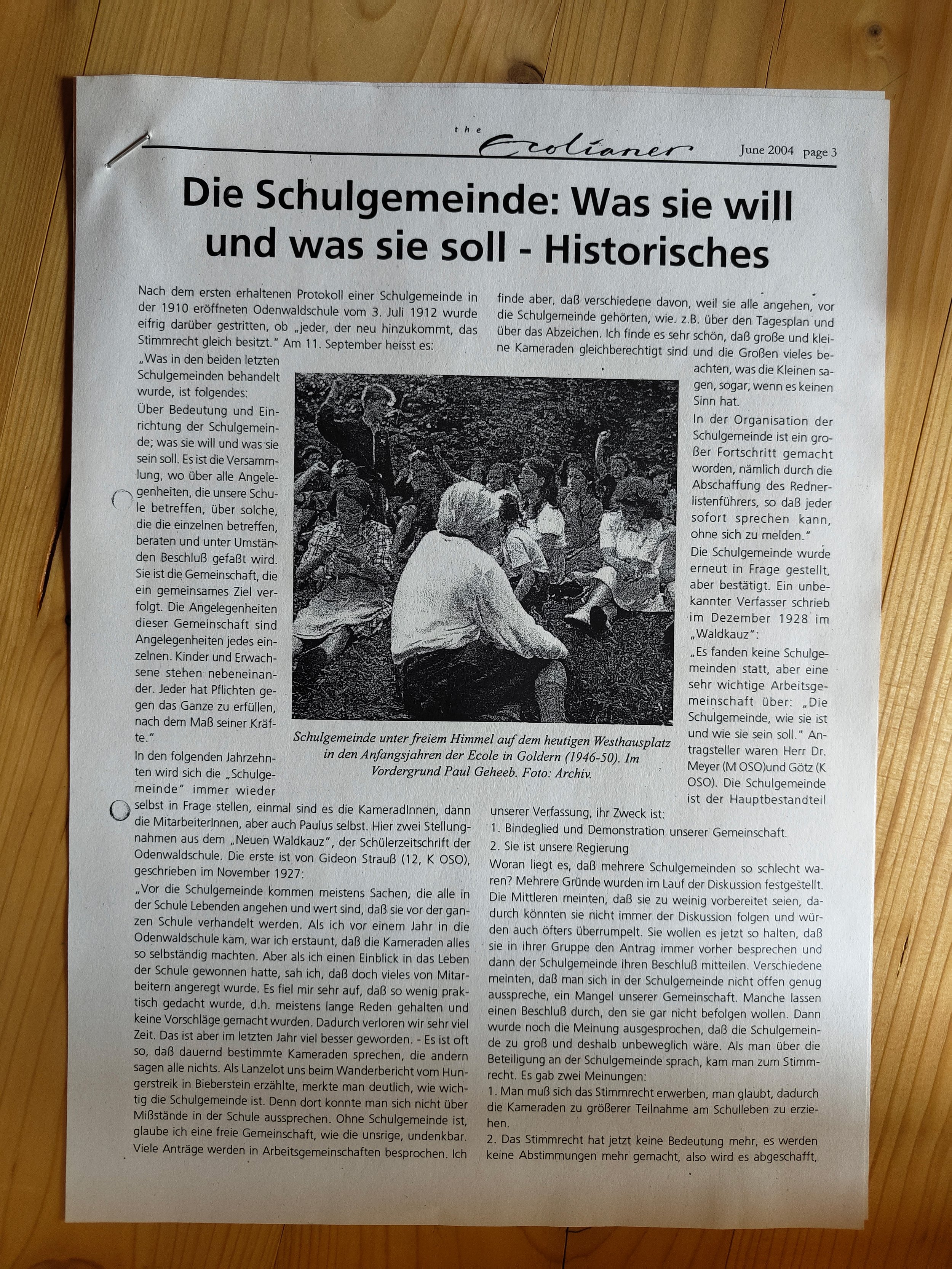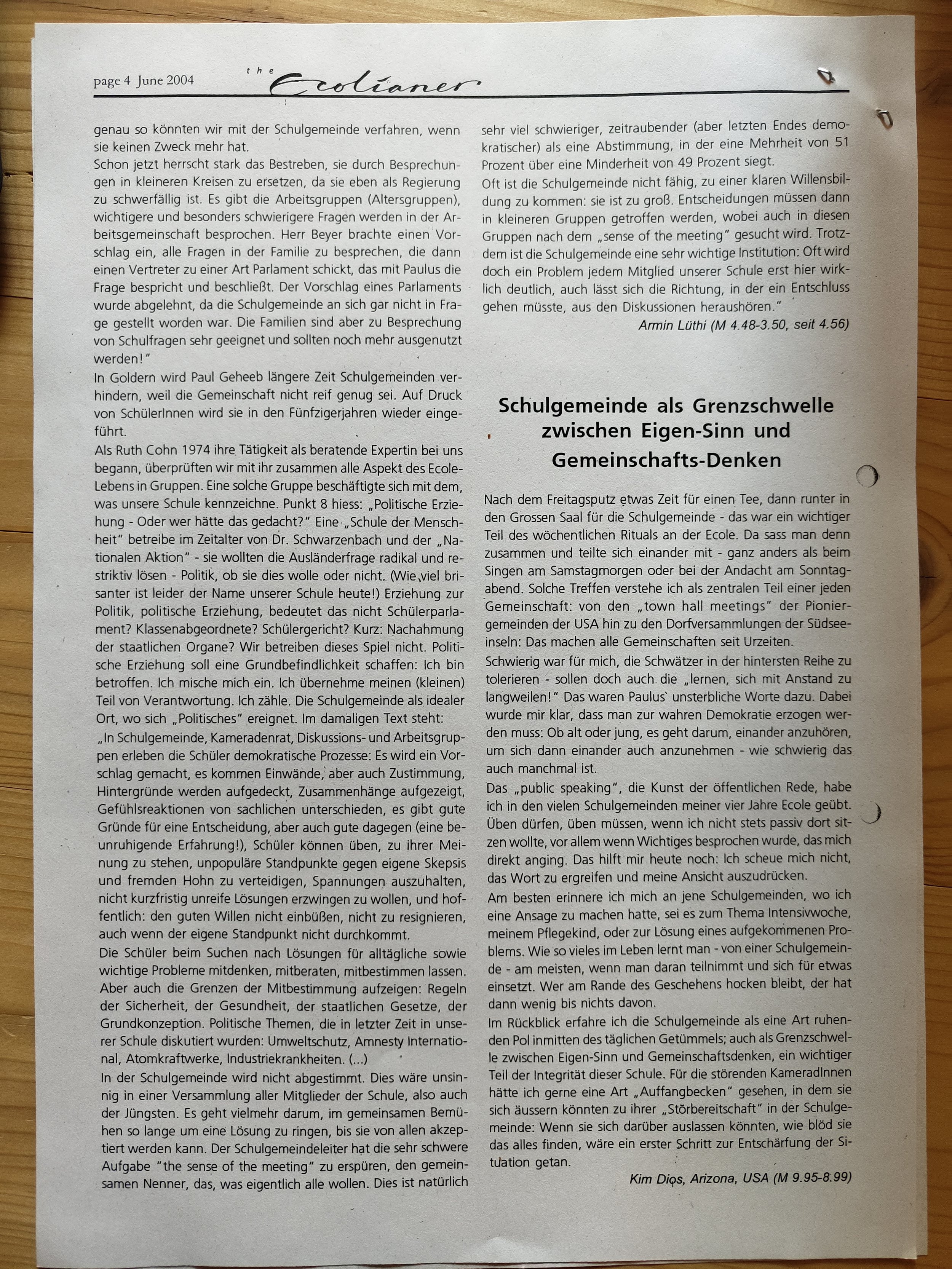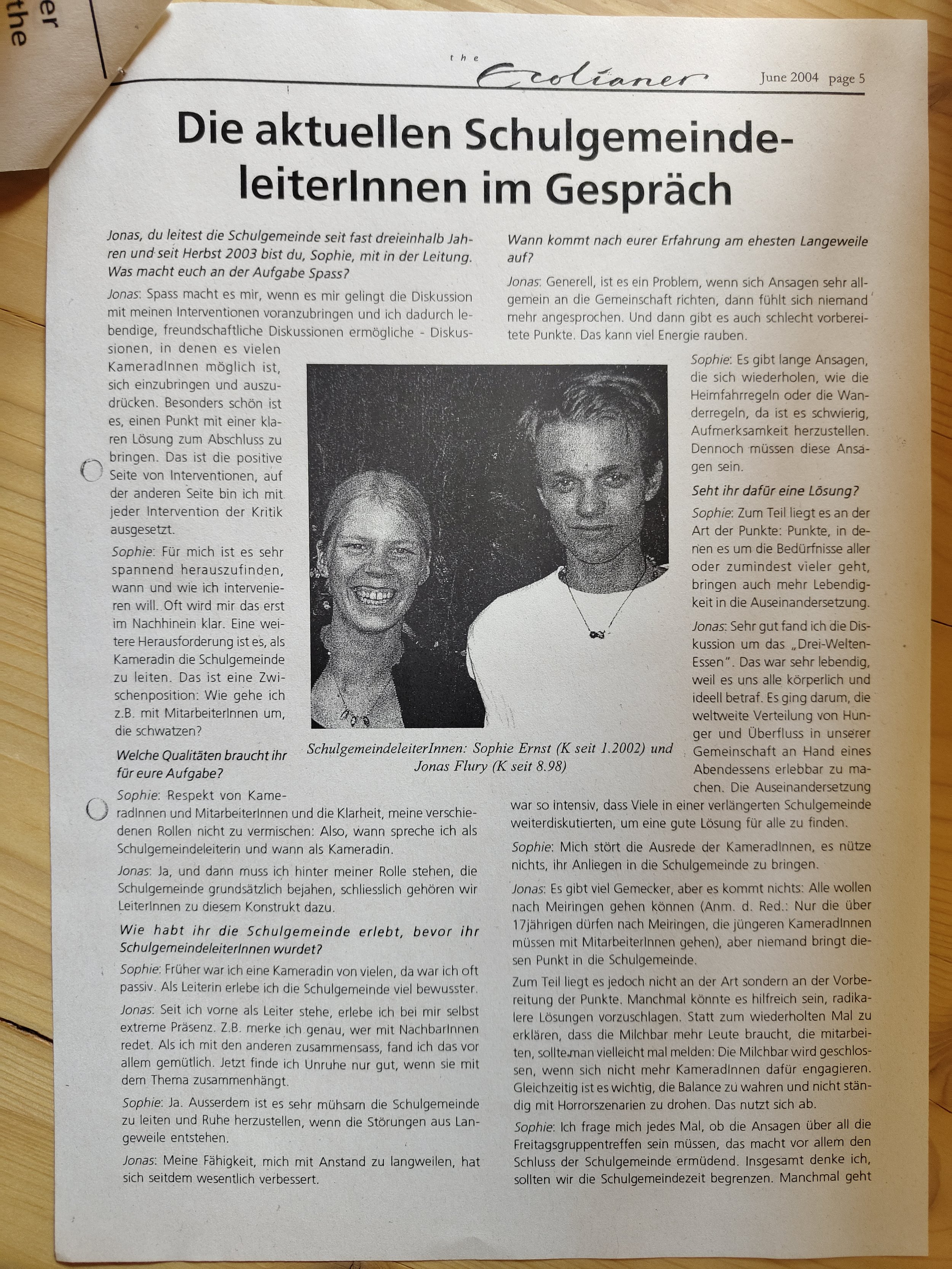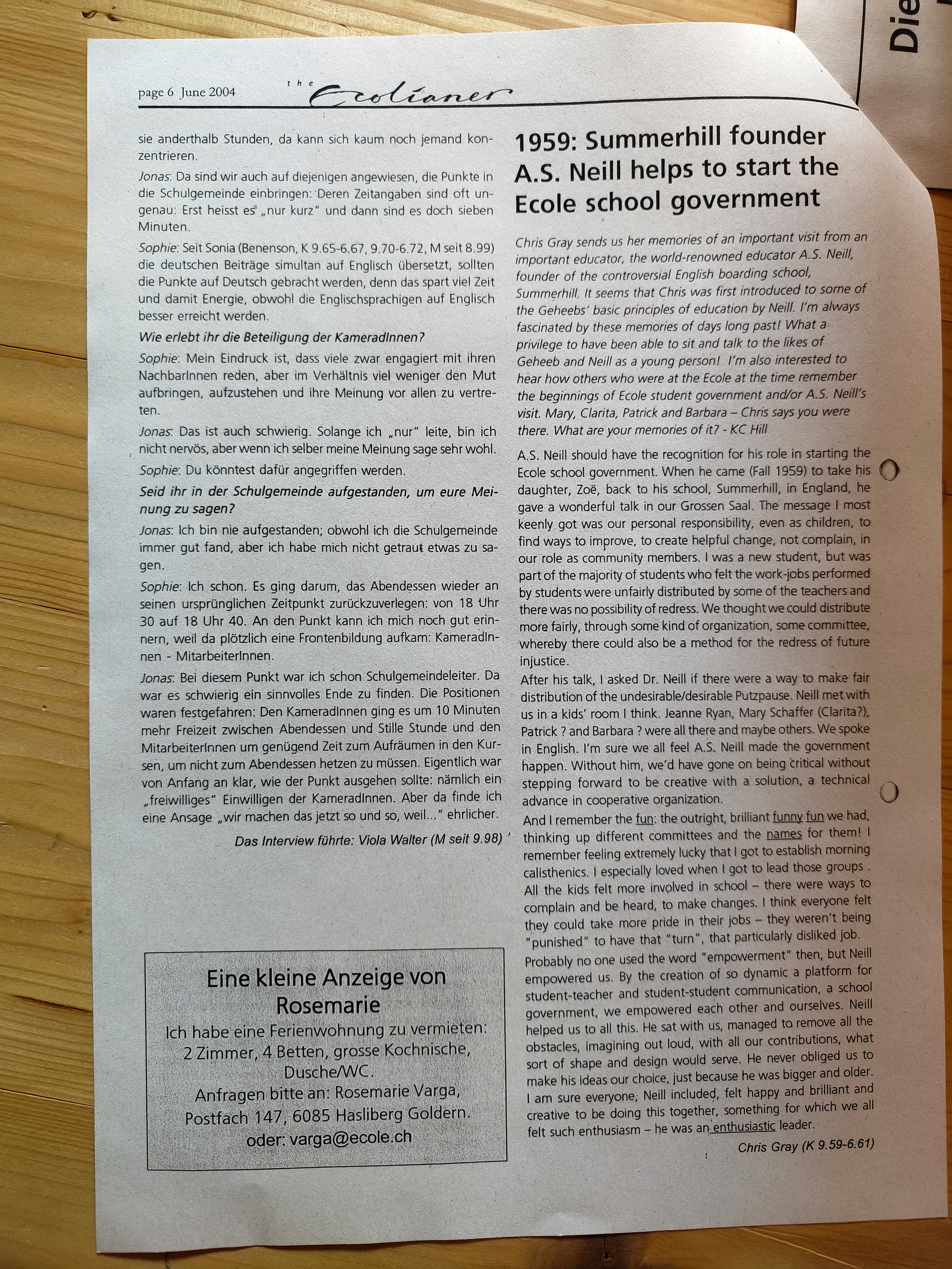Throwback Thursday: 21-year-old Ecolianer article about the Schulgemeinde
The 2004 issue of the Ecolianer featured a reflective piece on the Schulgemeinde, the Ecole’s weekly all-school assembly. Most of the article was originally written in German, with one contribution — found in the fourth image below — already in English. The text includes perspectives from Schulgemeinde leaders at the time, as well as from alumni and staff, exploring how the Schulgemeinde is experienced, the challenges it presents, and the role it plays in shaping life at the Ecole. You’ll find the full English translation below.
The commentaries, aside from the interview with the Schulgemeinde leaders, are by:
– Armin Lüthi (Mitarbeiter 4.48–3.50, 4.56 ff.)
– Kim Dios (Mitarbeiter 9.95–8.99)
– Chris Gray (Student 9.59–6.61)




Download as PDF
The Schulgemeinde: What it Wants and What it Is For – A Historical Perspective
According to the earliest preserved minutes from a Schulgemeinde at the Odenwaldschule (founded in 1910), dated July 3, 1912, there was a lively debate about whether “everyone who joins should immediately have voting rights.” On September 11, the minutes state:
“What has been discussed in the last two Schulgemeinden is the following: the purpose and structure of the Schulgemeinde; what it wants and what it should be. It is the assembly where all matters concerning our community, or individuals within it, are discussed and, under certain circumstances, decided upon. It is the collective that pursues a common goal. The concerns of this community are the concerns of each individual. Children and adults stand side by side. Everyone has duties toward the whole, in accordance with their abilities.”
Over the decades that followed, the Schulgemeinde repeatedly questioned itself – sometimes by students, sometimes by staff, and sometimes by Paulus himself. Here are two perspectives from the “Neuer Waldkauz,” the student newspaper of the Odenwaldschule. The first is by Gideon Strauß (12th grade, OSO), written in November 1927:
“Matters that affect everyone in the school and are worth being discussed by the whole school usually come to the Schulgemeinde. When I came to the Odenwaldschule a year ago, I was surprised that the students handled everything so independently. But once I had gained insight into school life, I saw that much was actually initiated by the staff. I also noticed that there was little practical thinking — long speeches were often made without any actual proposals. That cost us a lot of time. But this has improved significantly over the past year. It’s often the same people who keep talking, while the others stay silent. When Lanzelot told us during a hiking report about the hunger strike at Bieberstein, it became clear how important the Schulgemeinde is. At that school, students couldn’t speak out about problems. I believe that a free community like ours is unimaginable without a Schulgemeinde.”
Many proposals are discussed in working groups. Still, I believe that some of them, because they affect everyone, should be brought to the Schulgemeinde — for example, the daily schedule or the school badge. I find it wonderful that older and younger students are treated equally, and that the older ones often listen to the younger ones — even when what they say doesn’t always make sense.
The organization of the Schulgemeinde has improved significantly — for example, through the abolition of the speaker list book, so anyone can speak without having to sign up first. Only then did people start questioning the speaker directly.
There were times when no Schulgemeinden took place, but instead the very important working group “About the Schulgemeinde: what it is and what it wants.” The motion was submitted by Mr. D. Meyer (OSO) and Götz (K, OSO). This group formed the main foundation of our constitution. Its purposes were:
To link us more deeply with our community.
Is it our form of government?
Were previous Schulgemeinden really that bad? Several reasons came up during the discussion. Some said they weren’t well prepared and couldn’t follow the discussion or even attend. Others said that decisions were just presented in the Schulgemeinde, not discussed. Some students reported that you could say something and make binding decisions — but you weren’t allowed to laugh or joke. You had to support the staff member’s proposal if you didn’t want to undermine it.
Two students argued:
Voting rights must be earned. They thought this made votes more meaningful, but since no votes are held anymore, it’s being abolished.
Voting rights don’t matter anymore since votes are no longer held — so it’s being abolished.
Just as easily, we could abandon the Schulgemeinde if it no longer serves a purpose. Already now, there is a strong tendency to replace it with discussions in smaller groups, as it is seen as too cumbersome as a governing body. We have working groups (by age group), and particularly important or complex issues are discussed within them. Mr. Beyer suggested that all issues should be discussed in the families, which would then send representatives to a kind of parliament that would deliberate with Paulus and make decisions. The idea of a parliament was rejected, since the Schulgemeinde had not even been consulted about it. Still, the families are well suited for discussing school matters and should be utilized even more.
In Goldern, Paul Geheeb refused to hold Schulgemeinden for a longer period, as he felt the community was not mature enough. Under student pressure, they were reintroduced in the 1950s.
When Ruth Cohn began her work as a consulting expert with us in 1974, we explored all aspects of life in groups together with her. One such group described itself in a way that still fits many schools today. Point 1 read: “Political education – or what did you think?” A “school of humanity” is supposedly dealing with bread and weapons trade in the atelier, on “national action” – how should we solve the immigration issue legally – politics, do we even want that? (Two, far too few.) But there are also clear boundaries for the Schulgemeinde: participation has limits – safety, health, laws, and the school’s core concept.
Political topics recently discussed at our school included: environmental protection, Amnesty International, nuclear power, industrial diseases, etc.
There is no voting in the Schulgemeinde. That would be nonsensical – in an assembly of all school members, about 100 people. The goal is to engage in shared discussion until a solution emerges that everyone can accept. The Schulgemeinde leader has the challenging task of sensing “the sense of the meeting,” the common denominator – what everyone truly wants. This is, of course, much more difficult and time-consuming (but ultimately more democratic) than a vote where a 51% majority overrules a 49% minority.
Often the Schulgemeinde struggles to form a clear opinion: it’s too large. In such cases, decisions must be made in smaller groups, which also operate using the principle of consensus. Nevertheless, the Schulgemeinde remains a very important institution: often, an issue becomes truly clear to every school member during a session, and from the discussion, the direction in which a decision should go can often be discerned.
— Armin Lüthi (M 4.48–3.50, since 4.56)
Schulgemeinde as a Threshold Between Individual Will and Community Thinking
After Friday’s cleanup, there was time for tea, then we would go down into the Great Hall for the Schulgemeinde – it was an important part of the weekly ritual at the Ecole. We would come together and share thoughts – much like during singing on Saturday mornings or Sunday evening Andacht. These gatherings felt like a central part of any community: from the “town hall meetings” of pioneer settlements in the USA to village assemblies in the southern parts of Europe – this is how communities have gathered since ancient times.
It was hard for me, for example, to drag the whisperers in the back row into line – they were supposed to learn, as Paulus used to say, “to be bored with dignity.” Those were Paulus’s unforgettable words. At the same time, he was concerned that too much democracy might lead to chaos. Too much speech and excess in our communal gatherings, illustrated by the example of Drei-Welten-Essen, could also be off-putting. The Schulgemeinde sessions could become so intense that many left feeling overwhelmed and tired – even if they were very much part of the discussion.
“Public speaking,” the art of speaking in public, is something I learned in many Schulgemeinde meetings during my years at the Ecole. I had to learn it – even if I didn’t always want to speak. Especially when something important was being discussed, but I wasn’t yet ready to express myself – it helped me nevertheless: I stopped being afraid to speak up and share my point of view.
One memory sticks with me: a Schulgemeinde when I had to make an announcement – about Intensive Week, my caregiving assignment, or about solving a specific problem. So much of life is learned in such a Schulgemeinde – especially when you’re not just attending but actually participating, standing up and making an effort. Those who stay on the sidelines often get the feeling that nothing gets done.
Looking back, I think of the Schulgemeinde as a kind of compass amidst the daily commotion; a threshold between individual intention and communal thinking – an essential part of the Ecole’s integrity. For many fellow students, it also served as a “safety valve,” where they could express their frustrations or their “readiness to disrupt.” If you can speak openly about that without being punished or labeled as a troublemaker, then a first step has already been taken toward de-escalating the situation.
— Kim Dios, Arizona, USA (M 9.95–8.99)
Current Schulgemeinde Leaders in Conversation
Jonas, you’ve been leading the Schulgemeinde for nearly three and a half years, and since fall 2003, you, Sophie, have joined the leadership. What makes the role enjoyable for you?
Jonas: I enjoy it when I succeed in moving the discussion forward with my interventions and thereby enable lively, friendly conversations – discussions in which even quieter students can participate and express themselves. It's especially nice when a small conflict can be brought to a clear resolution. That’s the positive side of interventions. On the flip side, I often receive criticism for how much I speak.
Sophie: For me, it’s exciting to figure out what’s really behind a conflict. A big challenge is fulfilling this role as a student leader. It's a balancing act: for example, how do I deal with staff members who are whispering to each other?
What qualities are needed for your role?
Sophie: Respect from students and staff – and clarity: not mixing up my different roles. So I always make clear when I’m speaking as a Schulgemeinde leader and when I’m just a fellow student.
Jonas: Yes, and you also have to stand behind your role and fundamentally support the idea of the Schulgemeinde, since as a leader, you’re part of this structure.
How did you experience the Schulgemeinde before you became a leader?
Sophie: I used to just be one of many students, and I was pretty passive. As a leader, I now experience it much more consciously.
Jonas: Since I’ve been a leader, I notice very strong phases in myself – for example, when I feel obligated to my peers and speak more than others. Before, I found that annoying. Now I understand that it’s often related to the topic at hand.
Sophie: And it’s exhausting to lead a Schulgemeinde back into calm and focus when disturbances come from boredom.
Jonas: My ability to be bored with dignity has definitely improved.
When do you find boredom arises most easily?
Jonas: Generally, it's a problem when announcements are directed at the whole community – then no one feels truly addressed. And if points are poorly prepared, it drains energy.
Sophie: There are announcements that keep repeating, like travel rules or hiking safety. That makes it hard to hold people’s attention. But these announcements are still necessary.
Do you have a solution for that?
Sophie: Part of it has to do with the type of agenda points – topics that affect everyone’s needs are more vivid and real in the way they are discussed.
Jonas: I thought the discussion about the “Three Worlds Dinner” was excellent – very vivid and meaningful. It was about how to make global inequality in food consumption tangible within our own community using one evening meal. The discussion went on so long and intensely that many stayed after the session to continue.
Sophie: What bothers me is when students say, “It’s no use bringing my concerns to the Schulgemeinde.”
Jonas: There’s a lot of grumbling, but no action: everyone wants to go to Meiringen (editor’s note: only students over 17 are allowed to go to Meiringen alone, younger students must be accompanied by staff), but no one brings this issue to the Schulgemeinde.
Part of the problem isn’t just the topics themselves, but how they’re prepared. Sometimes it might help to propose more radical solutions. If we have to explain again that the milk bar needs people to run it and that staff members can’t do it alone, maybe we should just shut it down for a while. The milk bar would probably be missed more if students had to step up to support it. At the same time, it’s important to maintain balance and not constantly resort to threats or horror scenarios. That doesn’t help.
Sophie: Every time all the Friday group meetings are announced again, I ask myself why. That mostly happens at the end of the Schulgemeinde. All in all, I think we should limit the Schulgemeinde more. Sometimes it goes on for an hour and a half, and by then no one can concentrate anymore.
Jonas: And we also depend on the people who submit agenda items: their time estimates are often vague. First they say “just a short one,” and then it goes on for seven minutes.
Sophie: Since Sonia (Benenson, K 9.65–6.67, 9.70–6.72, M since 8.99) started simultaneously translating the German contributions into English, agenda items should ideally be presented in German. That saves a lot of time and energy – even though English speakers may be more effectively reached in English.
How do you perceive the participation of fellow students?
Sophie: My impression is that many are very engaged when talking to their neighbors, but far fewer have the courage to stand up and represent their opinion in front of everyone.
Jonas: That’s difficult. As long as I’m just “leading,” I’m not nervous – but when I want to express my own opinion, I get very nervous.
Sophie: You could be attacked for it.
Did you ever stand up in the Schulgemeinde to express your opinion?
Jonas: I never did – even though I always liked the Schulgemeinde, I never dared to say anything.
Sophie: I did. It was about moving the evening schedule back to its original time – from 6:30 p.m. to 6:40 p.m. I remember it well, because it suddenly turned into a real confrontation: students vs. staff.
Jonas: I was already a Schulgemeinde leader at that point. It was very hard to find a meaningful resolution. The positions were entrenched: the students wanted 10 more minutes of free time between dinner and Quiet Hour, and the staff needed enough time after classes to clean up before dinner. Actually, it was clear from the beginning how the point would end: with the voluntary agreement of the students. But I find it more honest to simply say, “We’re going to do it like this and that, because …”
The interview was conducted by: Viola Waller (M since 9.98)
